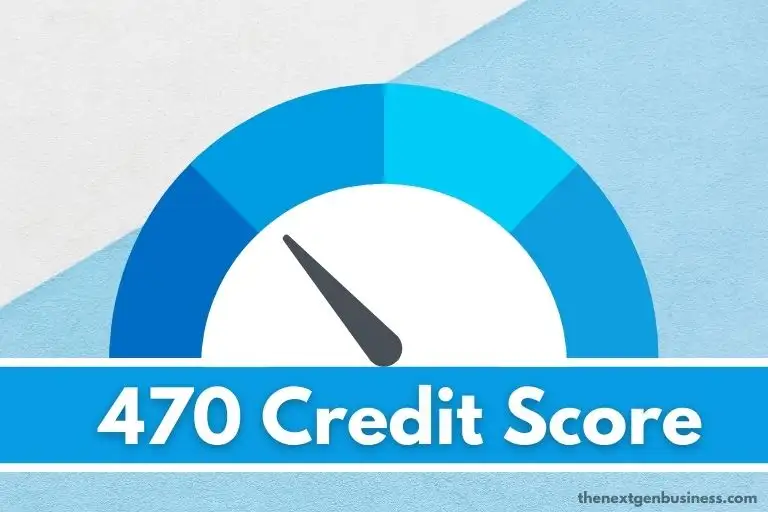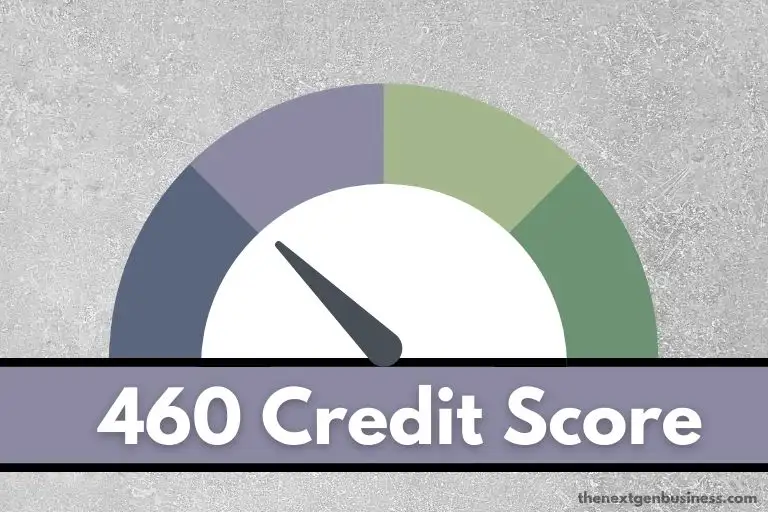
If you have a 470 credit score, you fall under the category of having poor credit. A poor credit score is a score that falls between 300 and 629. A 470 credit score makes it difficult to receive a good loan, get some jobs, and find housing.
In Short: A 470 credit score will typically result in a larger required security deposit, more expensive auto loans, and higher mortgage rates. Overall, lenders will be more skeptical about lending money to you if you have poor credit.
However, there are plenty of ways to improve your 470 credit score. It is entirely possible to obtain a 500, 600, 700, or even 800+ credit score.
Below you will find a complete list of all the ways you can improve your credit. On top of that, you will also find out if you can get a mortgage, personal loan, or auto loan with a 470 credit score.
What Can You Get With a 470 Credit Score?
Here is a quick overview of everything you can get with a 470 credit score:
- New Car Auto Loan: 10.38% APR
- Credit Card: 22.52% Interest Rate
- Mortgage / Home Loan: Very Unlikely
- 3-Year Personal Loan: 32.38% Interest Rate
Types of Credit Cards You Can Get With a 470 Credit Score
There are two types of credit cards that you can get with a 470 credit score, a secured credit card and an unsecured credit card. Each option has both potential benefits and downsides. Most credit cards you get with this credit score will have a 22.52% interest rate.
Secured Credit Cards
Getting a secured credit card comes with many benefits. But it also has a few drawbacks. A secured credit card is one of the go-to ways to build credit for those with a poor credit score.
The process of getting approved for this type of credit card is much easier compared to its unsecured counterpart. Lastly, some secured credit cards may offer the ability to earn rewards and other perks like cashback.
Potential drawbacks for a secured credit card include higher interest rates, fees, and a required security deposit. Although, one thing to consider with the security deposit is that your credit limit will often be determined by how much you initially deposit.
Unsecured Credit Cards
If you want to get a credit card but do not want to deposit any money as collateral, you can get an unsecured credit card.
Not having an initial security deposit requirement is one of the most beneficial aspects of an unsecured credit card. However, if you have a 470 credit score, you will likely have an annual fee.
Typically credit card annual fees are best avoided. The only time an annual fee makes sense is when the value received from the card surpasses the yearly fee.
Learn More: 469 Credit Score, 468 Credit Score
Can You Get an Auto Loan With a 470 Credit Score?
Getting an auto loan is possible with a 470 credit score. But receiving an auto loan with poor credit often results in a loan with a high interest rate. With a credit score of 470, any auto loan you get will likely have an APR of 10.38%.
Having a high interest rate on an auto loan means higher monthly payments. It also means you will be paying your lender more money in the long run. For auto loans, the lower the interest rate, the better.
For example, imagine you wanted a 60-month $12,000 car loan. According to Experian’s Q3 2021 State of the Automotive Finance Market report, deep subprime car loans (300-500 credit score) for new cars will have an average APR of 12.99%.
Your monthly payment on that car loan would be about $273. The total amount you would pay in interest would be $4,379.
Now take that same scenario and only change the credit score. If someone tried to get that same car loan, but they instead had a 700 credit score, the average APR on a new car would only be 3.64%, according to that same Experian report.
The monthly payment on a $12,000 60-month car loan with a 3.64% APR would be $219. In total, you would pay $1,143 towards interest.
Is a 470 Credit Score Good Enough For a Mortgage?
A 470 credit score will likely not be good enough for a mortgage. If you do manage to get a mortgage with a 470 credit score, the interest rate will assuredly be very high.
Conventional and FHA loans are two popular mortgage loans that many use to purchase real estate. Conventional loans usually require a minimum credit score of 620, and FHA loans require a minimum credit score of 580 with a 3.5% down payment.
Many decide to go with an FHA loan because you only need to put 3.5% down. However, it is only possible to get an FHA loan with a minimum credit score of 500 if you are willing to put 10% down.
Neither of these mortgage options is possible if you have a 470 credit score. It would be best to hold off on purchasing a house until you have at least a 500 credit score.
Can You Get a Personal Loan With a 470 Credit Score?
With a 470 credit score, it will be hard to get a personal loan, but not impossible. Those that manage to get a personal loan with a poor credit score will usually get a loan with a high interest rate. With this credit, you can expect a 3-year personal loan to come with a 32.38% interest rate.
Personal loans are often used to consolidate other types of debt with high interest rates, such as credit card debt. If this is your goal and you cannot get a personal loan with a lower interest rate, it would be impractical to take on the new loan.
If you get a personal loan with a 470 credit score, look at the interest rate attached to the loan. Everyone’s situation is different. But consider the potential downsides of taking on a loan with a very high interest rate. Check to make sure the benefits of getting the personal loan outweigh the possible disadvantages.
What Impacts Your 470 Credit Score
Here are the five most important factors that impact your 470 credit score.
1. Payment History
One of the largest factors that impact your credit score is your payment history. Missing a payment on a credit card or even not paying off your credit card at all can be detrimental to your credit score. Your payment history alone makes up 35% of your total credit score.
2. Credit Utilization Rate
Another factor taken into account when determining your credit score is your credit utilization rate.
To find your total credit utilization rate, take your credit card balance plus any revolving lines of credit divided by the combined credit limit of all your credit cards and any other revolving lines of credit.
3. Credit History Length
The length of your credit history is also a factor in your credit score. The longer your history is with using a credit card, the better.
Remember, closing a credit card that was opened many years ago can hurt your credit score. This is why it is best to try and avoid closing old credit cards if possible.
4. Mix of Credit Types
Having a mix of credit types also impacts your score. An example of having a good mix of credit types would be; opening a couple of credit cards, a mortgage, and an auto loan that you pay off on time every month.
5. New Credit
How often are you getting new credit cards? Every hard credit inquiry has the potential to reduce your credit score by a few points. That said, this change in your credit score usually is only temporary.
Best Ways To Improve a 470 Credit Score
These are the four best ways to improve a 470 credit score.
1. Check Credit Reports For Errors
If you find any false information on your credit report, it is possible to dispute any errors. When you dispute inaccuracies in your credit report, you can ultimately end up helping your credit score. This is why checking your credit report for errors is one of the first things you can do to improve your credit.
2. Catch Up on Missed Payments
Catching up on any missed payments will prevent your credit score from being harmed any further.
With a 470 credit score, your goal should be to improve it as much as possible. That means paying off any debts that have accrued.
After a while, debt collectors come knocking when you start missing payments. Additionally, you may have to consider the possibility of being sued by credit card companies or debt collection agencies.
Those with a 470 credit score likely have missed many payments. Catching up on those payments will help you avoid a lawsuit. It will also prevent your debt from ending up in collections.
3. Always Pay on Time
When you pay on time, it tells your lenders that you are financially responsible and are a low-risk borrower.
Making on-time payments will improve your credit over time. This is especially true for someone with poor credit.
4. Get a Secured Credit Card
A secured credit card is virtually the same as an unsecured credit card in the sense that they both can help improve your 470 credit score.
The main difference between a secured and unsecured credit card is that a secured credit card requires you to make a security deposit as collateral.
Often, you will see card issuers match your credit to the amount of money you deposit.
A secured credit card security deposit can be as low as $200 to as much as $5,000.
If you decided to deposit $1,000 towards a secured credit card, you would typically receive a $1,000 credit limit.
What To Do Next
Now that you know the factors that come into play when determining your credit score, you can begin to improve your 470 credit score.
Always pay your credit card, mortgage, and auto loan on time. Don’t take on debt know you can’t afford to pay back.
If you have a poor credit score, work towards improving it using the strategies listed above.
Be careful of anyone that says there is a fast or immediate way to improve your credit score. If you follow the tips mentioned earlier, your credit will improve, but it will take time.
Building up your 470 credit score cannot be done overnight. But gradually, over time, it can be worked on and fixed.




